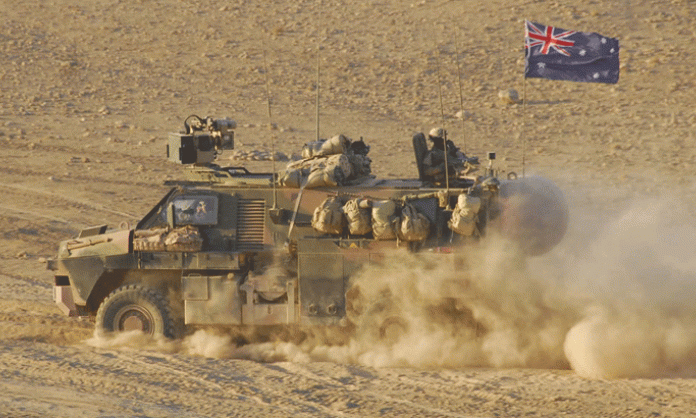The Australian military is winding up combat operations in Afghanistan, although several hundred personnel will stay in the country working as trainers or in Afghan military units.
This has been Australian imperialism’s longest overseas war. Over the course of 12 years, more than 20,000 troops have been rotated through the country at a cost of uncounted lives and nearly $8 billion.
Abbott, who was a member of the Howard Liberal government that enthusiastically committed material support to the US-led invasion, announced the drawdown in late October. During a surprise visit to Tarin Kowt, capital of Uruzgan province, the PM said that Australian military involvement ends “not with victory, not with defeat, but with, we hope, an Afghanistan that’s better for our presence”.
Abbott was flanked by Labor leader Bill Shorten. Their attempts at humility – talking of the troops’ sacrifice, honour and valour – failed to rise above sanctimony. It was a sickening display by a pampered couple immune to the reality of the war they and their colleagues unleashed and/or endorsed.
Australian memorials will recognise and mourn the 40 Australian soldiers who were sacrificed. Official history may acknowledge the several hundred injured.
But the government wants us to forget many things about this invasion and occupation: forget the tens of thousands of Afghans killed; forget US commanding officer former General Tommy Franks’ quip, “We don’t do body counts”; forget the torture, the rape, the at times indiscriminate murder; forget the humiliation endured by an occupied people; forget the corruption, the slimy deals, the shattered infrastructure and the blood-sucking NGO fest.
It wants us to forget the lies and shifting rationales for the occupation; forget the construction of sparkling shopping malls for expats, diplomats and the indigenous nouveau riche, while the mass of the population didn’t have access to proper sanitation; forget that the country is number one in the world for infant mortality – twice the rate even of Rwanda.
It wants us to forget that after 12 years, Western imperialism has been unable to quash the Afghan resistance.
Those of us who opposed this war from the beginning, who marched and protested and tried in the small ways that we could to stand in solidarity with those under siege, will not forget; we are already against the next war.
We will remember the voices of those who have fought truly – against the invaders from without and the oppressors from within – to make Afghanistan better. Those voices by and large have no body armour, no Green Zones in which to shelter, no military backup and no promise of a return to a protected life.
In particular, we will forever remember Malalai Joya, who Socialist Alternative was honoured to sponsor for our Marxism conference in 2012. These words, from her autobiographical Raising my voice, speak not just to the resistance to injustice in Afghanistan, but to the hope of a better world:
“I don’t fear death; I fear remaining silent in the face of injustice … I say to those who would eliminate my voice: I am ready, wherever and whenever you might strike. You can cut down the flower, but nothing can stop the coming of the spring.”








